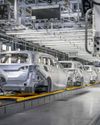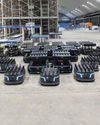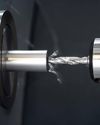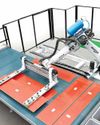
The air exchange rate with the outdoors is an important factor in determining indoor air pollutant concentrations. In addition, several other factors affect indoor air quality, including the air exchange rate, outdoor climate, weather conditions, occupant activities, and, to some extent, pollutants from manufacturing activities. Indoor air pollution has been investigated concurrently with outdoor air pollution. When outdoor air is polluted, ventilation transports pollutants from outdoor to the indoor environment. Indoor air pollution problems can arise from a single source or from any combination of factors. Most indoor air pollution comes from sources inside the building, such as:
Types of indoor air pollutants
Particulate Matter [PM1, PM2.5, PM10] impact on respiratory system
Health risks associated with Particulate Matter (PM) equal to or smaller than 1, 2.5 and 10 microns (µm) in diameter (PM1,PM2.5, PM10 respectively) are of particular public health relevance. Both PM2.5 and PM10 are capable of penetrating deep into the lungs, but PM2.5 can even enter the bloodstream, primarily resulting in cardiovascular and respiratory impacts, and also affecting other organs. PM is primarily generated by fuel combustion in different sectors, including transportation, energy, households, industry, and agriculture. Indoor Air Quality (IAQ) is a major concern for manufacturing plants, businesses, schools, and workers because it can impact health, comfort, well-being, and productivity of the building's occupants.
Importance of IAQ in manufacturing facilities
هذه القصة مأخوذة من طبعة April 2023 من EM - Efficient Manufacturing.
ابدأ النسخة التجريبية المجانية من Magzter GOLD لمدة 7 أيام للوصول إلى آلاف القصص المتميزة المنسقة وأكثر من 9,000 مجلة وصحيفة.
بالفعل مشترك ? تسجيل الدخول
هذه القصة مأخوذة من طبعة April 2023 من EM - Efficient Manufacturing.
ابدأ النسخة التجريبية المجانية من Magzter GOLD لمدة 7 أيام للوصول إلى آلاف القصص المتميزة المنسقة وأكثر من 9,000 مجلة وصحيفة.
بالفعل مشترك? تسجيل الدخول

From Smart Devices to 3D Printing: Innovations Shaping Medical Manufacturing
The medical device manufacturing sector is at the forefront of a technological revolution, driving innovation in healthcare and economic growth. With advancements like AI, 3D printing, and smart wearables, this industry is reshaping global healthcare solutions and accessibility.

"Autodesk is empowering businesses to streamline workflows, enhance productivity, and foster sustainability through innovative digital solutions"
…says Parminder Singh, Head, D&M Business, Autodesk India & SAARC, in conversation with Kaushal Dighavkar. He discusses how Autodesk’s advanced digital tools and AI-driven technologies are helping manufacturers optimise processes and stay competitive in the evolving market.

Driving Innovation:
The Role of Safety Automation Technology in Transforming India’s Automotive Manufacturing

Automated systems revolutionising industries
This article explores the transformative potential of robotics and industrial automation, diving into the most recent technical advances, their applications in a variety of industries, and the larger implications for the future of work and industry.

Union Budget 2025: A Boon for Manufacturing, MSMEs, and Economic Growth
The Union Budget 2025-26, presented under the overarching theme of \"Sabka Vikas,\" lays the foundation for a progressive and inclusive economic landscape.

Bharat Mobility Global Expo 2025:
Showcasing India’s Automotive Leadership on a Global Stage

Driving Innovation,Partnerships, and Technological Advancements
The Indian Machine Tool Manufacturers’ Association (IMTMA) successfully hosted IMTEX, Tooltech & Digital Manufacturing 2025 from 23 to 29 January 2025 at the Bangalore International Exhibition Centre (BIEC), Bengaluru.

LOGIQUICK: BACK TO DRILLING
ISCAR's LOGIQUICK campaign continues to push the boundaries of holemaking technology with cutting-edge innovations. From advanced SUMOCHAM drills to modular and micro-machining solutions, these developments enhance efficiency, precision, and versatility in modern machining operations.

Revolutionising Manufacturing: The Impact and Evolution of CNC Machining Technology
CNC machining has transformed manufacturing by enhancing precision, efficiency, and automation across industries. This article explores its evolution, technological advancements, and the impact of smart factory integration on modern production.

The Role of Sensors and Controls in Modern Manufacturing
The integration of advanced sensors and control systems is transforming manufacturing by enhancing precision, efficiency, and automation. These technologies are crucial for optimising production quality, minimising downtime, and enabling the shift towards smart manufacturing.